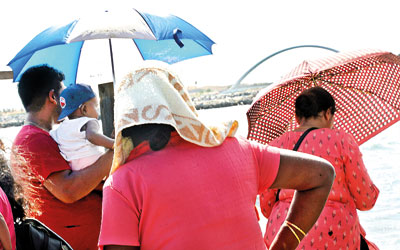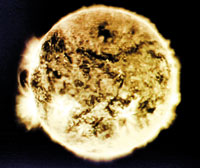News
UK lays out wider export pathway for Sri Lanka, offering lenient rules and zero duty
View(s):The influence of the El Niño has created the warming that causes changes in atmospheric patterns, leading to a weakening of the monsoon circulation over the region, Dr. Shiromani Jayawardena, director (forecasting) at the Department of Meteorology said.
Sri Lankans should prepare for more intense and frequent heat till the end of May.

More hot days ahead, says Met Dept. Pix by M.A. Pushpa Kumara
Monsoon rains are predicted after June. However, because of El Niño’s lower intensity during the monsoon, hot weather predominates.
“The periodic warming of the Pacific Ocean called El Niño has now set in. Warm water is forced eastward during an El Niño and the winds that normally round the equator slow down, elevating the temperature of the ocean’s surface,” she said.
At several locations in the Northern, North-Central, and Eastern provinces, as well as the Monaragala and Hambantota districts, the heat index, or the temperature felt on the human body, is anticipated to rise to “caution” level.
As the temperature has risen to about 36 degrees Celsius, the maximum temperature recorded from Mullaituvu/ Pottuvil was 35.7 °C; while the minimum recorded in Nuwara Eliya was 14 °C.
However, while the hot weather continues, met officials predict a few showers in the Galle and Matara districts, as well as in the Western, Sabaragamuwa, Central, and North-Western provinces. Showers, or thundershowers are likely at a few locations in the Eastern and Uva provinces throughout the evening or night.

Maximum temperature was recorded from Mullaituvu/ Pottuvil
| Global weather agency warns of higher temperaturesThe El Niño phenomenon often brings increased heat, drought or rainfall in different parts of the world, and the likelihood of it developing later this year is increasing, the global weather watchdog says.In an update on May 3, the World Meteorological Organization said El Niño would have “the opposite impacts on weather and climate patterns in many regions of the world to the long-running La Niña and would likely fuel higher global temperatures’’. A cooling La Niña over the past three years has acted as a temporary brake on global temperature increase, the WMO said. El Niño is associated with warming of the ocean surface temperatures in the central and eastern tropical Pacific Ocean. It occurs on average every two to seven years, and usually lasts nine to 12 months. The unusually stubborn La Niña has now ended after a three-year run, the WMO said. | |
The best way to say that you found the home of your dreams is by finding it on Hitad.lk. We have listings for apartments for sale or rent in Sri Lanka, no matter what locale you're looking for! Whether you live in Colombo, Galle, Kandy, Matara, Jaffna and more - we've got them all!

